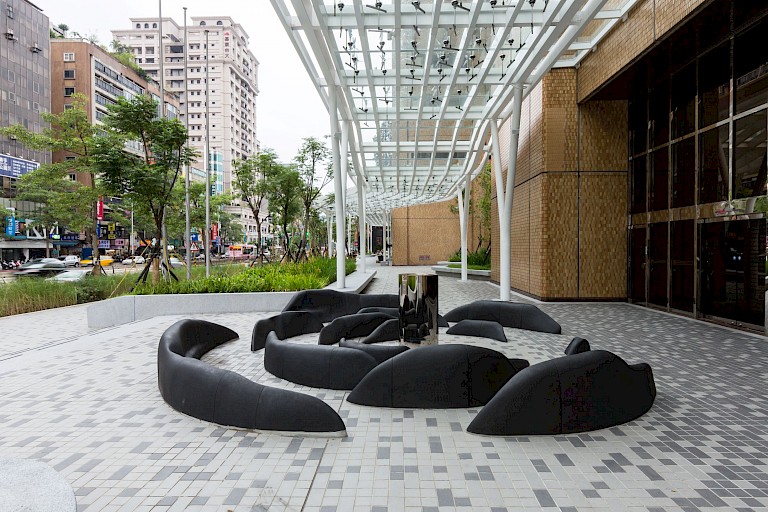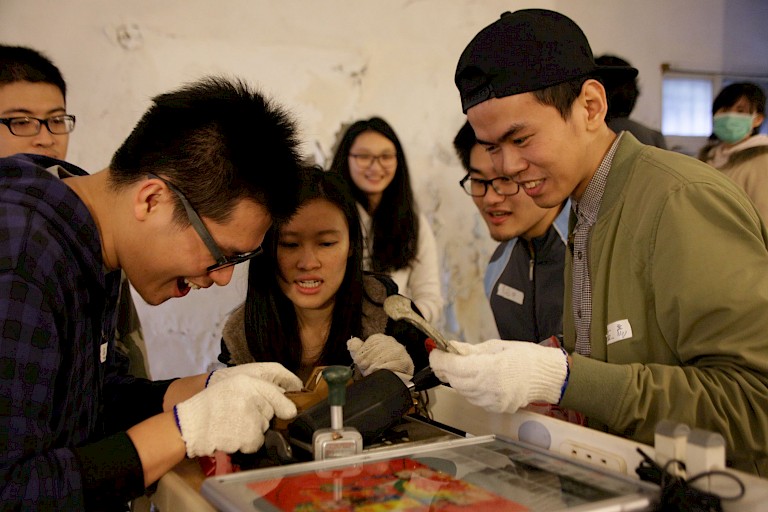



ARTIST: Po-Hung Liu, Mali Wu, Classic Design and Planning Co., Ltd., LuxuryLogico (Keng-Hau Chang, Geng-Hwa Chang, Kun-Ying Lin, Chih-Chien Chen), Li-Ren Chang, Chung-Kun Wang, noiseKitchen
ARTWORK/YEAR: A Different Light from the Willow Den (2016-18)
REGION: East and Southeast Asia
RESEARCHER: Peng-Chu Hsiung, Ai-Ming Lo
The Taipower Company has recently devoted itself to utilizing public art funds to promote artistic energy in the vicinity, in order to enhance chances of participation and to improve its corporate image. A Different Light for the Willow Den incorporates several sub-projects ranging from improving the public space of Taipower Building to organizing various promotional art participatory activities for neighboring residents, in the hope that citizens may come up with different thoughts and surprises when strolling along the Willow Den.
“Discovering a Different Light” includes several art campaigns featuring literature, music, images, energy, ecology, etc., which encourages participants to represent the Willow Den in various ways and to discover the visible and invisible spirit of this area. A wide range of participants have been engaged through multiple-session workshops, games, lectures, and experience-oriented activities. And the Taipower Company has also tried to express its core concepts of energy conservation in the process of interaction with the Willow Den communities.
The other two projects are environmental improvement for the Taipower Building. One of them is “A Beautiful Afternoon” for neighbors or customers, which represents the diversity of art in the spacious outdoors through four public artworks that integrate the energy recycling technology. “A Harmonious Grassland” on the other hand uses the first-floor lobby to install three works, artistically demonstrating “electricity.” Electric power may be invisible but is closely related to us. Through artistic interpretation and technical treatment, visitors may gain a concrete picture of electricity.
The Willow Den is close to the National Taiwan University, whose regional development has been tightly linked with its faculty, students and intellectuals, featuring independence, liberty and humanism. The Taipower Building is located in the center of the Willow Den. Owing to Taiwan’s long-term controversies over electricity, the image of Taipower Company has become questionable. Through this public art project, Taipower tried to offer local residents a way and a chance to know the Willow Den via an art-focused environmental improvement with various arts engagement activities, in order to improve its image in the communities. Up till now, the region has continued to change quietly with increased joining social groups. The communities began to actively respond and expand, unknowingly promoting the dialogues among various issues of the Willow Den.
While the works of A Different Light for the Willow Den were installed around the Taipower Building, the activities organized by various arts groups were launched at the same time.
“A Magical Fair on Paper”: set on the stage of the Willow Den, this reality game linked local stores and organizations, leading players to seek clues and to develop a uniquely fantastic story of the Willow Den.
“SOUNDSCAPE: Discovering the Light and Sound of the Willow Den”: on busy streets, students were led by artists to hear the Willow Den all over again and to observe the most familiar environment via various senses.
“Direct Delivery of Light”: urban dwellers were led back to nature, reflecting on the connection between energy and life behind modern convenience.
“Cooking with Nature”: residents from foreign places cooked their hometown dishes, reconnecting new people-to-people relationships and relationships between people and the land through diverse food ingredients and physical labor.
“Low Carbon Community: A Creative Site of Community Output”: Toad Commons is endowed with the quality of social support and mutual aid. As led by artists, everyone can be a maker and enjoy an individual creative process.
“Halftown Film Festival”: history is revisited through films, reviewing urban landscape and cultural scenery.
Image Credits: Taiwan Power Company
All copyright belongs to Shanghai Academy of Fine Arts, Shanghai University.




